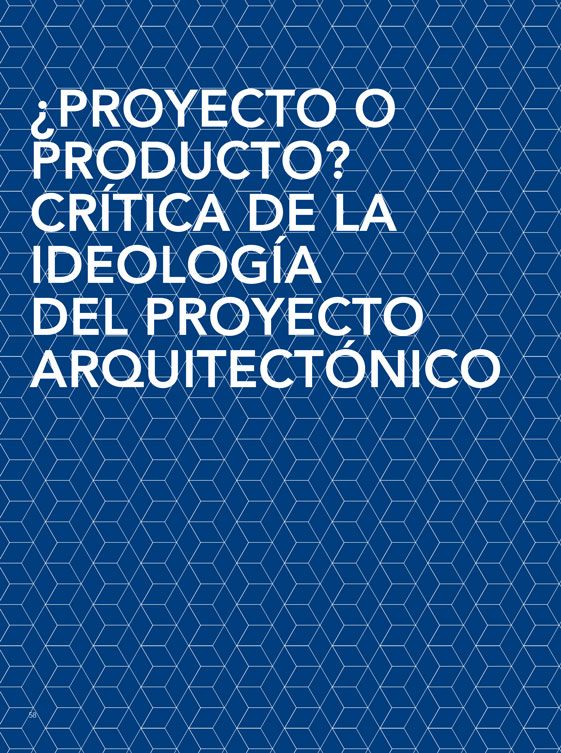¿Proyecto o producto? Crítica de la ideología del proyecto arquitectónico
Barra lateral del artículo

Palabras clave:
Contenido principal del artículo
Resumen
Los arquitectos hablan de su trabajo como proyectos, lo que es una forma admirable de optimismo acerca del futuro. Los proyectos van dirigidos hacia el futuro. Siempre miran hacia adelante; son una anticipación de victoria sobre las fuerzas de entropía en el mundo. Pero como tales, exigen deshacerse del lastre y el rechazo de cualquier cosa que impida su fluir. Ser “post-críticos” –un término que estuvo en boga entre los arquitectos hace algunos años– es no tener fricción. En este sentido, la ideología del proyecto arquitectónico es la de olvidar. Recordarnos a nosotros mismos que la arquitectura es producida, que los arquitectos son productores y también autores, que los edificios no son solo formas terminadas sino momentos en un ciclo de producción y que la arquitectura se esfuerza por ser hermosa en un mundo que es frecuente y trágicamente feo, es dar a las cosas que hacemos una historia y una conciencia e insistir en la solidaridad de nuestro trabajo con la sociedad en general.
Detalles del artículo
Materia Arquitectura proporciona acceso inmediato y gratuito a todos los contenidos de esta edición electrónica, publicada simultáneamente con la edición impresa. Materia Arquitectura no cobra honorarios a los autores por ningún concepto.
Todos los contenidos de esta edición electrónica se distribuyen bajo licencia Creative Commons de “Atribución-Copartirigual 4.0 Internacional” (CC-BY-SA).
La licencia Creative Commons permite el acceso libre e inmediato al contenido y permite que cualquier usuario lea, descargue, copie, distribuya, imprima, busque o genere enlaces a los textos completos de los artículos, permitiendo también que estos puedan ser rastreados para indexarlos, pasarlos como datos a software o usarlos para cualquier otro propósito legal. Asimismo, la licencia otorga derechos de uso a quienes a su vez utilicen una licencia abierta (Creative Commons o equivalente).
Los derechos de los textos y las imágenes publicadas pertenecen a sus autores, quienes otorgan a Materia Arquitectura la licencia para su uso. La gestión de los permisos y la autorización de publicación de las imágenes (o de cualquier material) que contenga derechos de autor y sus consecuentes derechos de reproducción en esta publicación es de exclusiva responsabilidad de los autores de los artículos.
Toda vez que mencionen su origen, los autores son libres de distribuir sus artículos por otros medios. Cualquier reproducción total o parcial del material deberá citar su procedencia.
Descargas
Citas
BARROW, L. R. (2000). Appendix 4. Case Study 2: Frank O.Gehry and Associates. En L. R. Barrow, Cybernetic Architecture - Process and Form - The Impact of Information Technology. Cambridge, MA: Harvard University (disertación PhD).
BENJAMIN, W. (1979). Reflections: Essays, Aphorisms, Autobiographical Writings. (E. Jephcott, Trad.) Nueva York: Harcourt Brace Jovanovich.
BOLTANSKI, L. & CHIAPELLO, E. (2005). The New Spirit of Capitalism. (G. Eliiott, Trad.) Londres: Verso.
DE BROSSES, C. (1760). Du culte des dieux fétiches, ou Parallèle de l’ancienne Religion de l’Egypte avec la Religion actuelle de Nigritie. París.
ENGELS, F. (1999). The Condition of the Working Class in England. Oxford: Oxford University Press.
GIEDION, S. (1954). Space, Time and Architecture (3a ed.). Cambridge, MA: Harvard University Press.
GIUFFRIDA, A. (9 de febrero de 2011). U.A.E. Construction Workers Stranded, with No Pay and No Prospects. New York Times. Recuperado de www.nytimes.com/2011/02/10/world/middleeast/10iht-M10WORKERS. html?pagewanted=all
JACOBS, A. (19 de Septiembre de 2011). China Shuts Solar Panel Factory after Antipollution Protests. New York Times. Recuperado de www.nytimes.com
MARX, K. (1976). The Fetishism of Commodities and Its Secret. En K. Marx, Capital (B. Fowkes, Trad., Vol. 1). Hammondsworth: Penguin Books.
MARX, K. (1981). The Trinity Formula. En K. Marx, Capital (D. Fernbach, Trad., Vol. 3). Hammondsworth: Penguin Books.
MUSCHAMP, H. (7 de septiembre de 1997). The Miracle in Bilbao. New York Times Magazine, pág. 72.
SMITH, J. H. & MANTZ, J. W. (2006). Do Cellular Phones Dream of Civil War? The Mystification of Production and the Consequences of Technology Fetishism in the Eastern Congo. En M. Kirsch (Ed.), Inclusion and Exclusion in the Global Arena. Londres: Routledge.
SOMOL, R. E., & WHITING, S. (2005). Okay, Here's the Plan. Log(5), 5-7.
Artículos más leídos del mismo autor/a
- Joan Ockman, Project or Product? A Critique of the Ideology of the Architectural Project , Materia Arquitectura: Núm. 08 (2013): Materia Arquitectura 08 (Diciembre/December 2013)